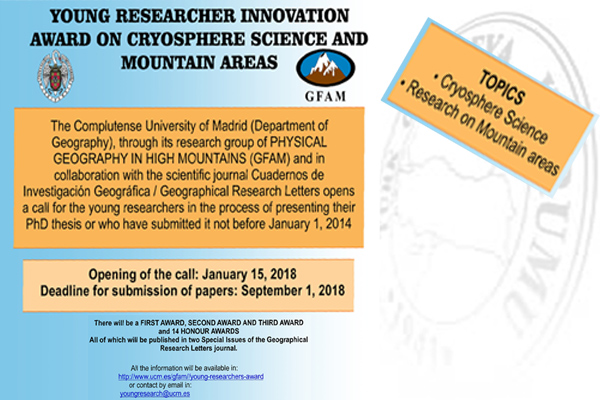YOUNG RESEARCHER INNOVATION AWARD ON CRYOSPHERE SCIENCE AND MOUNTAIN AREAS

YOUNG RESEARCHER INNOVATION AWARD ON CRYOSPHERE SCIENCE AND MOUNTAIN AREAS
COMPLUTENSE UNIVERSITY OF MADRID DEPARTMENT OF GEOGRAPHY RESEARCH GROUP OF PHYSICAL GEOGRAPHY IN HIGH MOUNTAINS
The Complutense University of Madrid, through its research group of PHYSICAL GEOGRAPHY IN HIGH MOUNTAINS (GFAM; https://www.ucm.es/gfam/ ), and in collaboration with the scientific journal Cuadernos de Investigación Geográfica / Geographical Research Letters ( https://publicaciones.unirioja.es/ojs/index.php/cig ), opens a call for the "Young Researcher Innovation Award in Cryosphere Science and Mountain Areas".
Traditionally, the academia environment imposes a protocol on the initiation of young researchers, according to the need of using already consolidated approaches within accepted ideas implemented by their senior advisers. This established model ensures their professional consolidation, but it undoubtedly limits and slows down the characteristic creativity of the youth. In fact, some of the most significant scientific advances have been made by young researchers, who break preconceived ideas and open up new horizons, often faced with the opposition of consolidated researchers.
With the purpose of promoting research in mountain areas and cryospheric processes, the Complutense University of Madrid and its GFAM research group, organizes an Award for young researchers working on those topics. Researchers must present an original unpublished work in a research article format, with a strong innovative approach, including new methods and breakthrough ideas that open new research perspectives.
A scientific committee will make a first selection of the works. Those that have been selected will be evaluated by two external reviewers with demonstrated experience in their specific fields. The scientific committee will propose the definitive selection of the awardees and of the papers deserving publication according to the view of the external evaluation. The selected and awarded works will be published in two Special Issues of the journal Cuadernos de Investigación Geográfica / Geographical Research Letters, one including works related to the Cryosphere Science and the other focusing on mountain areas in general.
PARTICIPANTS TOPICS PAPERS
Research topics should be encompassed in one of the two main fields:
a) Cryosphere Science (glaciology, permafrost, snow cover, frozen soils, glacial and periglacial geomorphology, biological processes in frozen areas, etc).
b) Research on Mountain Areas (meteorology, climatology, tectonics, geomorphology, volcanism, soils, biogeography, torrential dynamics, natural hazards, geoheritage, management issues, territorial planning, etc).
Young researchers in the process of presenting their PhD thesis or who have defended it not before January 1, 2014 are encouraged to participate. The papers may be submitted by several authors, but only the first author will participate in the competition. The other authors must sign a form confirming that the first author has led the research work. Each participant must also propose a senior researcher within their study area who will be an external evaluator for other works.
The manuscripts must be prepared following the format of the journal in terms of length and figure styles (see guidelines at: (https://publicaciones.unirioja.es/ojs/index.php/cig/about/submissions#authorGuidelines). They must be original works and authors must assign their contribution to one of the two thematic areas of the contest. Figures and photos will be published in color. A recommended length for the article should be between 10 and 25 pages, although texts with up to 35 pages plus photos and figures can be accepted. The research articles must be written in English.
EVALUATION CRITERIA
The works will be evaluated according to the following criteria:
(a) Innovative character in terms of the originality of the approaches, applied methods, cross-cutting nature and, especially, viability of the results when opening new frontiers in research. Ability to critically evaluate well-established methods with arguments and seek new solutions to traditional methodological limitations.
(b) Quality of the research, where the conclusions are duly supported by the analysis of the information.
(c) Quality in the communication, both in the way of structuring the work, and in the written and graphic language when expressing the process and result of the investigation.
EVALUATION PROCESS
The manuscript will be evaluated in a first selection by the editors of the respective topics, with the help of a scientific committee, until selecting a maximum of 30 works for each of the two thematic areas. The selected works will be sent for evaluation to external referees, with the help of those proposed by the participants. The editors and the scientific committee of each area, in light of the external evaluation, will select the awarded works (up to a total of 17 per subject), and, where appropriate, send the works back to the authors for final corrections.
EDITORS
Each of the thematic areas and, therefore, each Special Issue, will be organized by a group of editors, composed of GFAM members and other external leading experts in the subject. The editors will coordinate the entire process until the final publication of each Special Issue.
Editors of Cryosphere Science Special Issue: David Palacios (Complutense University of Madrid), José M. García-Ruiz (CSIC), Marc Oliva (University of Barcelona), José María Fernández-Fernández (Complutense University of Madrid).
Editors of Research on Mountain Areas Special Issue: Nuria Andrés (Complutense University of Madrid), Amelia Gómez-Villar (University of Leon), Luis Miguel Tanarro (Complutense University of Madrid), Jesús Ruiz-Fernández (University of Oviedo).
SICIENTIFIC COMMITTEES
Each of the thematic areas will have a scientific committee including world experts in the subject that will assess in the evaluation and selection of the works.
KEY DATES
The works will be gradually published online by the journal as they are edited. It is expected that they will be published in paper and in color in 2020.
AWARDS
There will be one prize for each of the two areas. There will be a FIRST AWARD, SECOND AWARD AND THIRD AWARD and 14 HONOUR AWARDS so each Special Issue will have a total of 17 articles, which will make up the corresponding Special Issue. The award and nominations will be announced at newsletters of the GFAM and MOUNTAIN RESEARCH INITIATIVE, INTERNATIONAL ASSOCIATION OF GEOMORPHOLOGISTS, INTERNATIONAL GEOGRAPHICAL UNION, INTERNATIONAL PERMAFROST ASSOCIATION.
Opening of the call: January 15, 2018
Deadline for submission of papers: September 1, 2018
Resolution of the first selection: October 15, 2018
- Rejected works will be returned to the authors
- The accepted papers will be sent to external referees for evaluation.
Resolution of the second evaluation: January 30, 2019
- The rejected works will be returned, suggesting potential improvements on singular topics and recommending other publications.
- The selected works will be sent to the authors, with the required corrections to proceed for publication.
Final presentation of the awarded works: March 30, 2019
Outcome and award announcement: May 1, 2019
Start of the process of editing the works: May 1, 2019
INFORMATION AND CONTACT
All the information will be available in
http://www.ucm.es/gfam//young-researchers-award
The manuscripts must be sent to
youngresearch@ucm.es
where further information can be requested, if necessary
Address
YOUNG RESEARCHER INNOVATION AWARD
Department of Geography
Faculty of Geography and History
Complutense University of Madrid
Ciudad Universitaria, Madrid 28040, Spain
Phone (34) 913945955
Universidad Complutense de Madrid
Grupo de investigación Geografía Física de Alta Montaña





